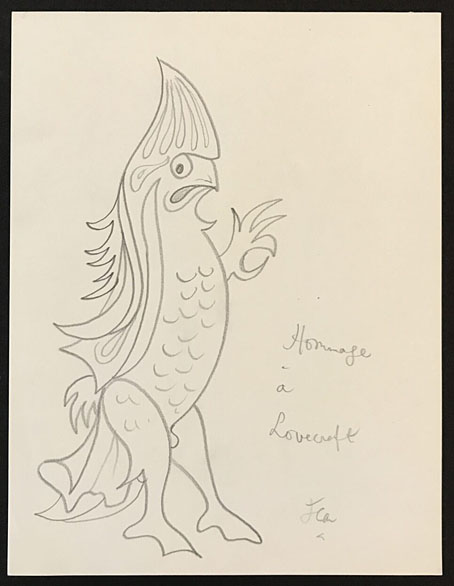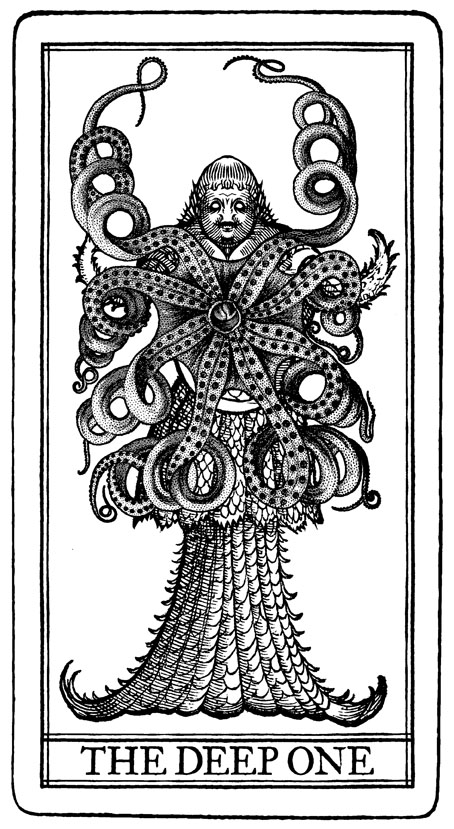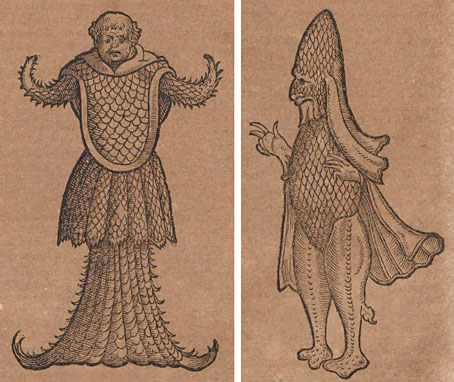
This one arrives via Tentaclii, via ST Joshi’s news page. Jean Cocteau paying homage in pencil to HP Lovecraft is both unlikely and almost too good to be true. But the drawing, circa 1951, is from a Beverly Hills gallery where other Cocteau artwork is up for sale so it can be accepted as the genuine article.
Cocteau’s enthusiasm for Lovecraft’s fiction doesn’t seem to be news either, even though this is the first I’ve heard of it. Another of Joshi’s links is to this newspaper feature from 1954 in which Cocteau together with various notables of the time are asked to choose their books of the year. While the other contributors list the kinds of titles you’d expect, Cocteau has a book about Atlantis by Denis Saurat, books about parapsychology and “les soucoupes volantes” (flying saucers), plus the first French collection of Lovecraft’s stories, translated by Jacques Papy. I knew that Cocteau had a mystical side—you’d expect nothing less from the director of Orphée—but this combination of Lovecraft and full-on crankery is a surprise. He lived just long enough to see the first publication of Pauwels and Bergiers’ Ur-text of the 70s’ crankosphere, The Morning of the Magicians, so I can imagine him lapping up that one as well.
As for the doodle, this is Cocteau’s version of a sea-monster illustration from Conrad Gessner’s Historia Animalium (1551–1558), a five-volume study which includes a number of fantastic creatures among its descriptions of the animal life known to 16th-century Europeans. Gessner has a page or two about the so-called “sea bishop” which includes this illustration together with another one I adapted myself in 2010 for the Neil Gaiman story in Lovecraft’s Monsters. Good to know that Cocteau and I were on the same page, as it were.

Elsewhere on { feuilleton }
• The Lovecraft archive
Previously on { feuilleton }
• Cocteau drawings
• Querelle de Brest
• Halsman and Cocteau
• La Belle et la Bête posters
• The writhing on the wall
• Le livre blanc by Jean Cocteau
• Cocteau’s sword
• Cristalophonics: searching for the Cocteau sound
• Cocteau at the Louvre des Antiquaires
• La Villa Santo Sospir by Jean Cocteau


I got ‘The Morning of the Magicians’ out of the public library in Glenview Illinois when I was 13 or 14 in the 1960’s. It was a formative book for me. I had no idea what was plausible and what was crazy.
I’m delighted to hear about Cocteau and Lovecraft. Your posts just keep on giving. Thanks.
My head-fuck book at that age was Illuminatus! which eventually led me to The Morning of the Magicians since they borrowed from it. The thing I like about Pauwels & Bergiers’ book is that it’s a great blend of weirdness that you just have to dive into. Even if it’s not saying anything coherent, the strange connections fire the neurons in a way that many of the books that thieved from it never achieve.
I’d be surprised if Cocteau didn’t know Jacques Bergier. He wrote the intro for the Lovecraft edition that Cocteau recommends, and must have been one of the first French readers of American weird fiction. Weird Tales magazine published two letters from him in 1936 and 37 praising Lovecraft’s and Robert Bloch’s stories.
It’s noteworthy that in the 1954 Observer piece Cocteau says Lovecraft’s “loose” style gains by French translation. I’ve often thought a back-translation of a French translation of Lovecraft would be an interesting exercise, if only for the Verfremdungseffekt.
Yes, I was wondering what he meant by that. I can’t imagine the difference between translation and original being too great if Jacques Bergier gave the French edition his approval.
I took it to mean that Cocteau saw the French translation as an “improvement” on the original, stylistically speaking, rather in same the way that Baudelaire’s translations of Poe are considered by many in France to be superior to the originals.
Cocteau speaks about Lovecraft in the volumes of Le passé dfini, his diaries from the Fifties.
Thanks, Gonzalo, that’s something I ought to read.